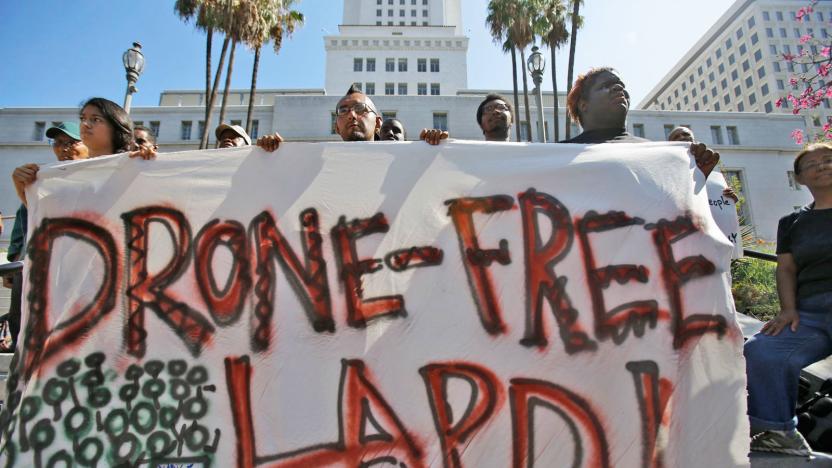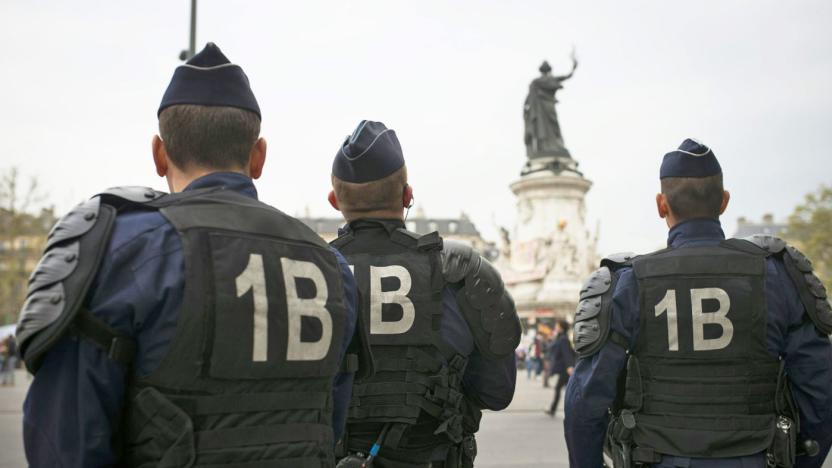TL17DRNPRV
Latest

Los Angeles police will test drones despite privacy concerns
American police have certainly used drones before, but not on this scale. The Los Angeles Police Commission has voted in favor of letting the LAPD fly drones in a year-long pilot program, making it the largest US police department to ever rely on the robotic aircraft. The force will use the drones for aerial searches, recon in tense situations (think: standoffs) and other tasks where officers would otherwise be at risk. The machines could save lives, according to the LAPD, but there were numerous concessions made to address privacy concerns -- and some people still aren't convinced these limits will prevent abuse.

Paris police want drones to watch over crowds
Paris' police force is understandably anxious about crowd security as of late, and it's turning to technology in a bid to track threats hiding in those groups. It's planning to buy hexacopter drones that would be used for close crowd surveillance. The machines will have to meet very specific criteria: they'll have to clearly spot a license plate from 50m (164ft) away, fly at altitudes of 100m (328ft), require no more than 5 days of training and use encrypted connections to avoid hacks. In essence, they have to serve as an extra set of eyes that law enforcement can use without a moment's hesitation.

Judge says drone was invading the privacy of the man who shot it
William Merideth, the man from Kentucky who shot down a drone earlier this year, told WDRB that he felt vindicated after a district judge dismissed the charges against him, even if the accuser can still take the case before a grand jury. He was originally charged for firing his gun within city limits, but the judge has decided on Monday that the drone invaded his privacy, giving him the right to shoot it. The judge came to that conclusion after two witnesses testified that the UAV flew below the tree line of Merideth's property. However, the Phantom 3 drone's owner and pilot, David Boggs, provided Ars Technica with a video back in August showing that his machine was flying 200 feet above the ground. Boggs said that the judge didn't bother looking at the video he provided, a decision that he claimed shocked even the police officers involved in the case.

DOJ lays down some privacy rules for feds flying drones
The Justice Department promises to keep a closer eye on how its agencies are using drones from now on -- after all, they can be useful in nabbing suspects, but they can also be used as a tool to abuse power. In its new five-page policy guidance, the department has listed when its agencies can and can't use drones, with a focus on people's right to privacy. For instance, they can't be deployed to monitor activities protected by the First Amendment, such as peaceful protests. Authorities will also have to secure warrants to use the machines in places where the subject of investigation has "reasonable expectation of privacy." Obviously, the drones can only be used for authorized investigations and never for engaging in discriminatory acts.

Ad outlet tries using drones to track your phone's location
Irked that advertisers are already trying to pinpoint your phone's location? It might be even harder to escape their grasp if AdNear is successful. The ad intelligence group is experimenting with location-tracking drones that profile audiences in harder-to-reach areas (say, field concerts or pedestrian-only urban areas) by triangulating cellular and WiFi signals. In theory, this will help merchants find ways to attract you when you're walking by.

Los Angeles police don't want you flying drones over their stations
The cops may be eager to experiment with drones for tracking bombs and (possibly) suspects, but they're apparently not that keen on people turning the tables. The LAPD claims that activist Daniel Saulmon was trespassing when he flew a machine over a Hollywood police station's parking lot. He was spying on "private property," Lieutenant Michael Ling claims. As you might imagine, Saulmon (who has a history of recording officers on the ground) disagrees. He didn't step inside, after all, and he contends that law enforcement doesn't have the same privacy rights as individuals.

US to write privacy rulebook for commercial and civilian drones
You may not be able to fly your drone wherever you want, but there's no rules on what you can actually do with it. That's likely to change, with Politico reporting that President Obama will tell the NTIA to draw up privacy guidelines for unmanned aerial vehicles. The rulebook will only cover commercial and hobbyist activities, but should stop nefarious eyes from straying too close to your bathroom window when you're not looking. Military and law-enforcement hardware, meanwhile, will require separate rules, which is likely to come from individual states. When asked, the White House gave issued a standard no comment, but let slip that an "inter-agency process" was underway to co-ordinate America's stance on drone use. Of course, since commercial drone use is still banned in the US -- with some exceptions -- there's at least time for the government to thrash out a cohesive policy on the matter.



